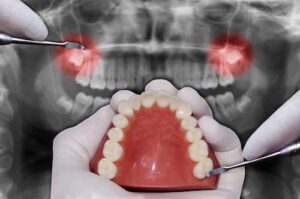
If your tooth is broken or damaged and cannot be fixed with a filling or crown, our dentist may decide to extract it as a final resort. One or more of your third molars (wisdom teeth) located at the back of your mouth are removed. This may occasionally necessitate surgical treatment.
Your wisdom teeth are the final four major grinding teeth (molars) to emerge from the rear of your mouth. You should get them by your mid-twenties; however, some people have them earlier or later.
When your wisdom teeth don’t come through correctly, they’re said to be impacted. This can result in complications such as discomfort, swelling, and infection. These symptoms can be relieved by having your wisdom teeth removed.
Why would I need to have my wisdom teeth removed?
Wisdom teeth do not always have to be removed. They go through normally for many individuals and create no difficulties. However, because your wisdom teeth are the last to emerge, there is sometimes insufficient room in your mouth for them to grow correctly.
They may get partially embedded in your gums or develop at an angle. This is referred to as an impacted wisdom tooth. Even if impacted wisdom teeth aren’t producing any symptoms, they don’t necessarily need to be removed.
However, the location of an impacted wisdom teeth can make it easier for food and germs to become trapped around the gum. This can result in inflamed and painful gums (pericoronitis), tooth decay, and infection. If you’re experiencing these symptoms, your dentist may advise you to have the impacted tooth extracted.
What happens during wisdom teeth removal?
The technique for removing your wisdom teeth will differ depending on how tough it is to extract your teeth. Upper wisdom teeth are typically easier to remove than lower wisdom teeth. Our dentist will be able to tell you exactly what to expect.
When you have your wisdom teeth extracted at the dentist, you will normally be given local anesthesia. The local anesthetic will totally relieve the discomfort in your gums, but you will remain conscious while your wisdom teeth are extracted. If you are an anxious patient, sedation as well as local anesthesia may be provided to you. This helps you to relax.
If you have your wisdom teeth extracted in a hospital, you may be given general anaesthetic. You will be sleeping during the operation if you get a general anaesthetic.
After the anaesthesia has taken effect, our dentist may use special equipment to carefully slide your tooth out, sometimes cutting into the gum. If your dentist or surgeon has cut into your gum, dissolving sutures may be required to seal the wound.
